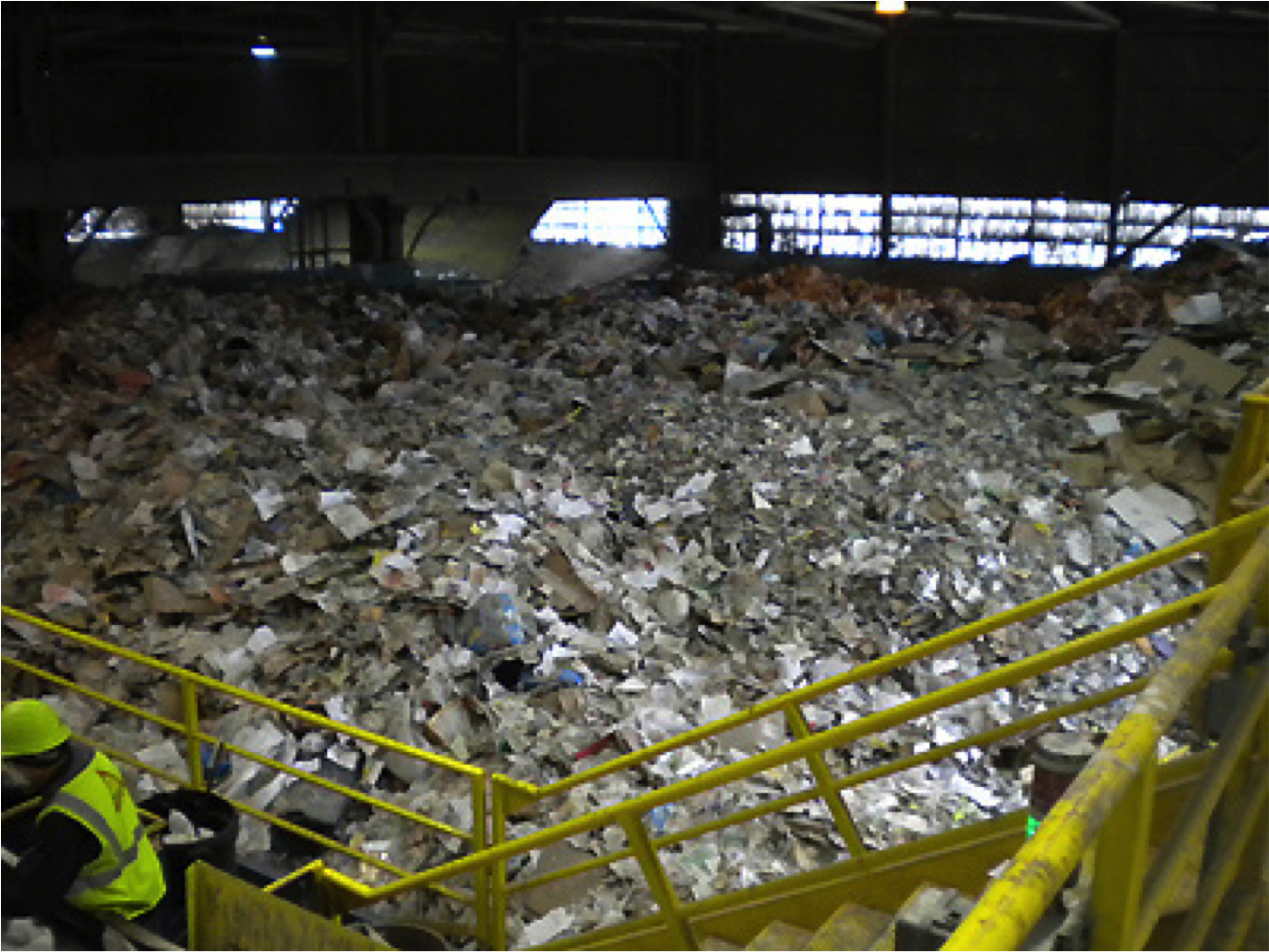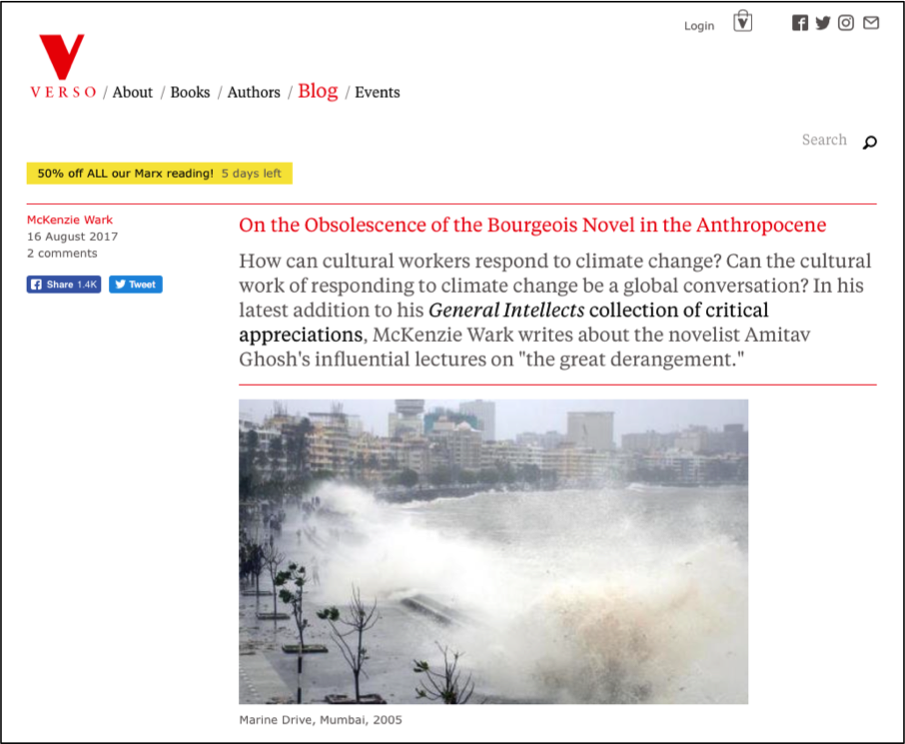On the Obsolescence of Bourgeois Theory in the Anthropocene
 Tuesday, June 12, 2018 at 6:31PM
Tuesday, June 12, 2018 at 6:31PM Many thinkers are currently attempting to replace the tyranny of the human with an emphasis on the nonhuman, the posthuman and the Anthropocene. Yet as I showed in Pirate Philosophy, such post-theory theorists continue to remain bound up with the human in the very performance of their attempts to think through and beyond it. Regardless of the anti-humanist philosophies they profess — be they inspired by Deleuze, Kittler or Latour — in their practices, in the forms their work takes, in the ways they create, publish and disseminate it, in their associated upholding of notions of individual human rights, freedom, property and so on, they continue to operate in terms of a liberal, humanist model of what it is to be a theorist.
What forms is critical theory to take then if, in its performance, it is not to be simply liberal and humanist – nor indeed human — but something else besides? To put this question another way: what are the possibilities for inhuman modes of theory? By this I mean theory that is able to take account of and assume (rather than ignore or otherwise deny) an intra-active relation with both human and nonhuman others, be they animals, plants, objects, technologies, the environment or the cosmos?
 Bacteria on mobile phones
Bacteria on mobile phones
Why ‘inhuman’? My use of this term is intended to emphasise that the human cannot be simply contrasted to the nonhuman. There is no such thing as the nonhuman – nor the human for that matter. The nonhuman is already in(the)human. Each is born out of its relation to the other. The inhuman is thus a mode of being, thinking and doing with the nonhuman. It follows that any such inhuman theory could also be understood as an instance of the inhumanities. For if the inhuman equals the human intertwined with the nonhuman, then a humanities with this intra-active inhuman figure at their heart must become the inhumanities.
Of course, such an intra-active understanding of authorship and subjectivity could be gathered under the sign of the posthuman and posthumanities. As Janneke Adema and I have shown, however, approaches to the posthumanities have been dominated by the ‘posthuman humanities’ of Rosi Braidotti, Donna Haraway, Cary Wolfe and others. My proposal is that the above transformative conception of the human and the humanities can therefore on occasion be more productively articulated in terms of the inhuman. The idea is that such a rhetorical and conceptual shift might enable us to better challenge to the self-identical, liberal humanist subject that serves as a blind spot or datum point in so many theories — not just of the humanities, but of the posthuman and posthumanities too. Indeed, building on the argument developed by McKenzie Wark in ‘On the Obsolescence of the Bourgeois Novel in the Anthropocene’, could we go so far as to characterise the inability of so much contemporary theory to operate according to a more inhuman mode of philosophy as a sign of its obsolescence? (1)
Wark’s text on the bourgeois novel was published on the blog of Verso Books as an addition to the collection of critical appreciations he provides in his 2017 volume General Intellects: Twenty-One Thinkers For The Twenty-First Century. While the chapters in General Intellects offer succinct analyses of individual thinkers such as Isabelle Stengers, Timothy Morton and Quentin Meillassoux, Wark’s focus in ‘On the Obsolescence of the Bourgeois Novel’ is The Great Derangement: Climate Change and the Unthinkable by the writer and novelist Amitav Ghosh. In this non-fiction book Ghosh contemplates the environmental crisis and global warming from a literary perspective that has origins in the Indian subcontinent. As far as he is concerned, it is not just about ecological problems, or even capitalism and its carbon-based political economy. Climate change is about empire: it is about imperialism. Above all it is about climate justice. Providing an account of Ghosh’s influential lectures on the great derangement thus enables Wark to conceive of a geo-humanities project that brings earth science into contact with ‘post-colonial voices that have pushed back against imperial mappings of the world.’ At the same time, he acknowledges that approaching climate change in terms of social justice brings with it a conceptual challenge. As Wark articulates it when quoting from The Great Derangement: ‘One has to avoid excluding the diversity of human voices, and yet at the same time avoid excluding the non-human world and rendering it a mere background, or "environment." One has to voice “the urgent proximity of nonhuman presences”’.
Ghosh approaches this conceptual challenge as a literary problem. The difficulty, however, is that climate change goes beyond what can be expressed in the form of the bourgeois novel. The issue for Wark is summed up by the fact that ‘fiction that takes climate change seriously is not taken seriously as fiction’. Hence, for him, some of the best responses to the Anthropocene have been provided by science fiction. Hence, too, Ghosh’s concern that we are now ‘entering into a great derangement’. Wark describes this as ‘a time when art and literature concealed rather than articulated the nature of the times and the time of nature.’ Instead of dealing with the Anthropocene, novels become choked with what, following Franco Moretti, can be termed ‘filler, the everyday life of bourgeois society, its objects, decors, styles and habits'.
The reason the bourgeois novel is obsolete, then, is because it has not ‘adapted to new probabilities.’ Nowhere is this more apparent according to Wark than with respect to the ‘centrality of the improbable’, by which he means the Anthropocene as an epoch that ‘alters a predictable one’ so that it is no longer about either gradual or catastrophic time, orderly or apocalyptic change, but rather a temporality of a third type. (It’s here he sees Rob Nixon’s notion of slow violence as coming into play.) Instead, Wark characterises the bourgeois novel as ‘a genre of fantasy fiction smeared with naturalistic details — filler — to make it appear otherwise. It excludes the totality so that bourgeois subjects can keep prattling on about their precious “inner lives.”’

Yet critical theory has not adapted in the Anthropocene either. In fact, to include contemporary theory seriously in the argument Wark makes about literature and art only serves to place further emphasis on the idea that we are arriving at ‘a great derangement’, a period when no element remains in its original place. For ours is a time when theory too can be said to obscure rather than express the changing nature of the times and the time of nature. As with the bourgeois novel, it’s a derangement that works through formal limitations – and this despite the fact that one of the reasons critical theory continues to be important is because of its ability to denaturalize the parameters within which our professional forms, methods, and procedures of knowledge operate. In the case of theory (and both literary and genre fiction, I might add, although this seems to be something that the commercially-minded, liberal humanist professional in Wark prevents him from seeing, at least in his essay on Ghosh),(2) these limitations involve the named individualistic human author, the codex book, the fixed and finished text, originality, authenticity, copyright and so on. And as with the modern novel, the screening out of this scaffolding — this ‘faded frame’, as David Theo Goldberg has referred to it — ‘“continues to be essential”’ to the functioning of what we might now rather teasingly refer to as bourgeois theory. To further paraphrase Ghosh by way of Wark, here then is the great irony of theory in the Anthropocene: ‘the very gestures with which it conjures up’ nonhuman actors, objects and elements ‘are actually a concealment’ of them.
The performance of serious theory today is thus as formally limited to liberal humanism as the novel. (As Wark says in his essay on Moretti: ‘It is about making something of this world, not transcending it in favor of another.’ So there is no adventuring into the unknown, ‘no spontaneous bravery’, ‘“few surprises”’. It might be ‘hard work’, being a bourgeois writer or theorist, ‘but it’s a steady job’.) This means it’s extremely difficult, if not impossible, for even the most radical of theories to do anything other than exclude the diversity of human and nonhuman presences. To resample and remix Wark’s text on the novel in the Anthropocene as a means of further undercutting notions of the author as self-identical human individual: anything that would actually impact on the concealment of theory’s established scaffolding, how it’s created, published and circulated, is regarded as not proper, experimental, odd, and risks banishment. ‘But from what? Polite bourgeois society?’ The for-profit world of Verso books and Routledge journals where proper theory can be found?
In this way theory eliminates the ‘improbable’ — including non-humanist, non-liberal, non-grammatological, non-rivalrous or non-commodifiable ways of being and doing — ‘from serious consideration’.
(As examples designed to provoke further speculation I could refer here to the fact that the Amazon has recently been declared a 'subject of rights' by Colombia’s supreme court in a bid to protect it from further deforestation; that the Whanganui river in New Zealand has been given the same rights as a human person; and that an orang-utan in Argentina called Sandra has been declared by the courts there to also have legal rights. If nonhuman things can now have rights and be the party of interest in administrative proceedings, can we envisage reaching a point in the future where a work of critical theory can be legally and professionally recognised as having been co-authored by an ape, a river, a forest, an ecosystem, even by nature in general? If so, what then would the consequences be for our notions of the author, originality and copyright? Does even asking such improbable questions not involve us in imposing legal and professional strictures designed for humans onto nature?) Certainly, from the point of view of bourgeois theory, that which is outside its inherited liberal humanist frame in this respect can only appear as ‘strange’, ‘weird’, ‘freaky’. Any such ‘strangeness’ emanating from an actual engagement with the implications of the Anthropocene can thus be kept in the ‘background’, the unmarked environment in which theory takes place, or moved into it.
Like the bourgeois novel, such theory — with rare exceptions — ‘draws a sharp distinction between the human and the nonhuman’, not to mention the ‘collective and collaborative’. Here, too, the actions of individual human agents are treated as ‘discontinuous with other agents’, elements and energies (including ‘the masses, peoples, movements’), even though ‘“the earth of the Anthropocene is precisely a world of insistent, inescapable continuities…”’.
We can thus see that bourgeois theory clearly ‘isn’t working’. The nonhuman, climate change, the Anthropocence in general, all exceed what the form of proper theory can currently express. Like the novel, it has not adapted to the new reality ushered in by the Anthropocene, including all those laws and legal decisions that are starting to pile up around the question of the rights of nature. Certainly, the last thing such theorists want is for any of this to actually impact on their own ways of performing as authors. Instead, theory ‘imposes itself on a nature it cannot really perceive or value’. Just as ‘serious fiction, like bourgeois culture, now seems rather unserious, indeed frivolous’, so too does serious theory.

The nonhuman may be what a lot of contemporary theory studies and writes about, but it cannot take seriously the implications of the nonhuman for theory. As a result, the current landfill of theoretical literature on the Anthropocene is merely a form of bourgeois liberal humanism smeared with nonhuman filler — objects, technologies, animals, insects, plants, fungi, compost, stones, geological formations — to make it appear otherwise.
Endnotes
1) I should stress that my understanding of the inhuman is somewhat different from that of Wark. For him, the inhuman is ‘an apparatus of labor and technology. Indeed, the inhuman is the zone where the partition between the human and nonhuman is negotiated, at the expense of rendering the inhuman labor in between invisible. There is no such thing as a "history of ideas," only of the labor and technics of producing them’ (McKenzie Wark, ‘On the Obsolescence of the Bourgeois Novel in the Anthropocene’, Verso (blog), August 16, 2017: https://www.versobooks.com/blogs/3356-on-the-obsolescence-of-the-bourgeois-novel-in-the-anthropocene).
2) Wark comes a little closer to doing so in his earlier text on Franco Moretti and the bourgeois novel, 'The Engine Room of Literature'. Here he suggests that 'Moretti’s evolutionary model for thinking about the novel', in which the:
tree of literature is constantly sprouting new branches, but some die off, taking their place in the fossil record of 'the great unread.' … explains very well ... how the market feedback loop exaggerates differences in success between the more and less fit kinds of literary form.
It is a ‘matrix of bourgeois culture’ in which ‘all of literary criticism participates’, according to Wark, regardless of whether it does so consciously or not. In the higher echelons ‘it may be all high-minded talk of resistant readings and counter-canons, but down in the engine room the business of literature is all about making variants on products for a panoply of markets.’
It would be interesting to pursue this line of thought in the context of Isabel Waidner’s argument about experimental literature in the U.K. and elsewhere being extremely white and middle class, to the exclusion of queer, working class and other nonconforming voices. See her introduction to Liberating the Canon: An Anthology of Innovative Literature. Suffice it to say for now that it leads Wark to conclude that: 'It must surely pass through the minds of many professional readers of Moretti that our works, too, are just variations of forms, thrown on the market, where a fickle readership — mostly of grad students — decides for itself whether the form addresses the actual tensions they experience in everyday life.'








Reader Comments